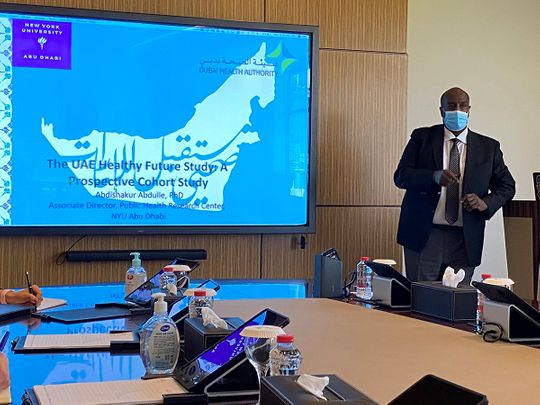Dubai: Dubai Health Authority (DHA) has sent out an appeal to all Emiratis above the age of 18 to be part of an ambitious study that focuses on examining the causes of chronic diseases in society and seeks to educate and prevent the rise of these diseases with informed action. It held a round-table discussion on Wednesday in collaboration with the Public Health Services department of New York University Abu Dhabi (NYUAD) to announce the study and ask Emiratis to volunteer for this study.
Assessing triggers and risks of chronic diseases among Emiratis, the study titled ‘The UAE Healthy Future’ is an ongoing project initiated by the Public Health Research Department of NYUAD, in collaboration with all health-care stake holders across the UAE. The goal is to examine real-time data from more than 20,000 Emiratis, aged 18 and above, and determine what aspect of their lifestyle, environment, genes or other risk factors such as obesity, diabetes and cardiovascular diseases — including genetic, microbial and biochemical factors — are seriously damaging their health.
DHA signed a Memorandum of Understanding (MOU) with NYUAD to facilitate this study.
Proliferation of Type II diabetes
Among the top chronic diseases existing in the UAE, the highest mortality rates occur with ischemic heart disease (61.2 per cent), strokes (41.4 per cent), diabetes (37.5 per cent) and chronic kidney disease (33.4 per cent).
According to current data, nearly 40 per cent of all UAE residents above the age of 40 suffer from Type II diabetes and about 19 per cent of residents across the UAE have diabetes, while 12 per cent are pre-diabetic?
Providing this information, Dr Fatheya Al Awadi, consultant Endocrinologist at Dubai Hospital and chairperson of DHA’s Diabetes Committee, pointed out that groundbreaking research through actual studies of individuals was the way forward in collecting valuable data and acting upon it.
Spearheading the study
The alarming rise in chronic non communicable diseases such as diabetes, cancer, hypertension, stroke, kidney disease and so on, presents a serious cause for worry and undermines the future of the country. Presenting the project details, Dr Abdi Shakur Abdulle, assistant director of the Public Health Research Centre at NYUAD, said: “We intend to examine the health of the cohort of 20,000 people and record their vitals in the present time and examine their progress periodically, determining the factors that trigger some lifestyle disease. Using this knowledge, if we are able to effect even 5 per cent incidence of diabetes, for instance, our mission would be accomplished. These kinds of study conducted in the West over many years have been able to provide vital clues to the progress of several illnesses such as heart diseases. However, these studies were conducted with Caucasian subjects. We need such a comprehensive study for this region, with people of this region, spread over years to understand the roots and causes of their health issues and address them.”
Active collaboration
So far in the four years since the study was initiated, the department has conducted a pilot study and so far about 8,000 Emiratis have signed up for the study. Now with active collaboration of all health-care entities in the country, the scope and area of the study need to be widened to reach the target of 20,000. Therefore, many more Emiratis need to come forward and volunteer as subjects, said Dr Muna Al Tahlak, CEO of Latifa Women and Children’s Hospital, who presided over the meeting.
How Emiratis can participate
Emiratis who are residents of Dubai can log on to https://uaehealthyfuture.ae and book an appointment with the Dubai Blood Donation Centre. For other emirates, the website provides venues and appointments can be made over the phone with the venue closest to one’s residence. The candidates need to present their National ID and sign a consent form.
Once the basic is done, the candidate has to arrive in person and be a part of the clinical process.
If a candidate is found to be suffering from diabetes or any other disease at the time of volunteering, the study will closely monitor the person’s health and assess what changes took place and why.

